INSIDE ISSUE 19.37 | Sept. 11, 2020
 BIG STORY: Citizen coalition pushes to enact hate crimes legislation in S.C.
BIG STORY: Citizen coalition pushes to enact hate crimes legislation in S.C.
NEWS BRIEFS: What to expect in next week’s session
SPOTLIGHT: Riley Institute at Furman University
COMMENTARY, Brack: Fall for kindness, not coarseness, in days ahead
LOWCOUNTRY, Ariail: Nullification
FEEDBACK: Send us your thoughts
MYSTERY PHOTO: Lonely building?
HISTORY: Pre-order your copy today!
Citizen coalition pushes to enact hate crimes legislation in S.C.
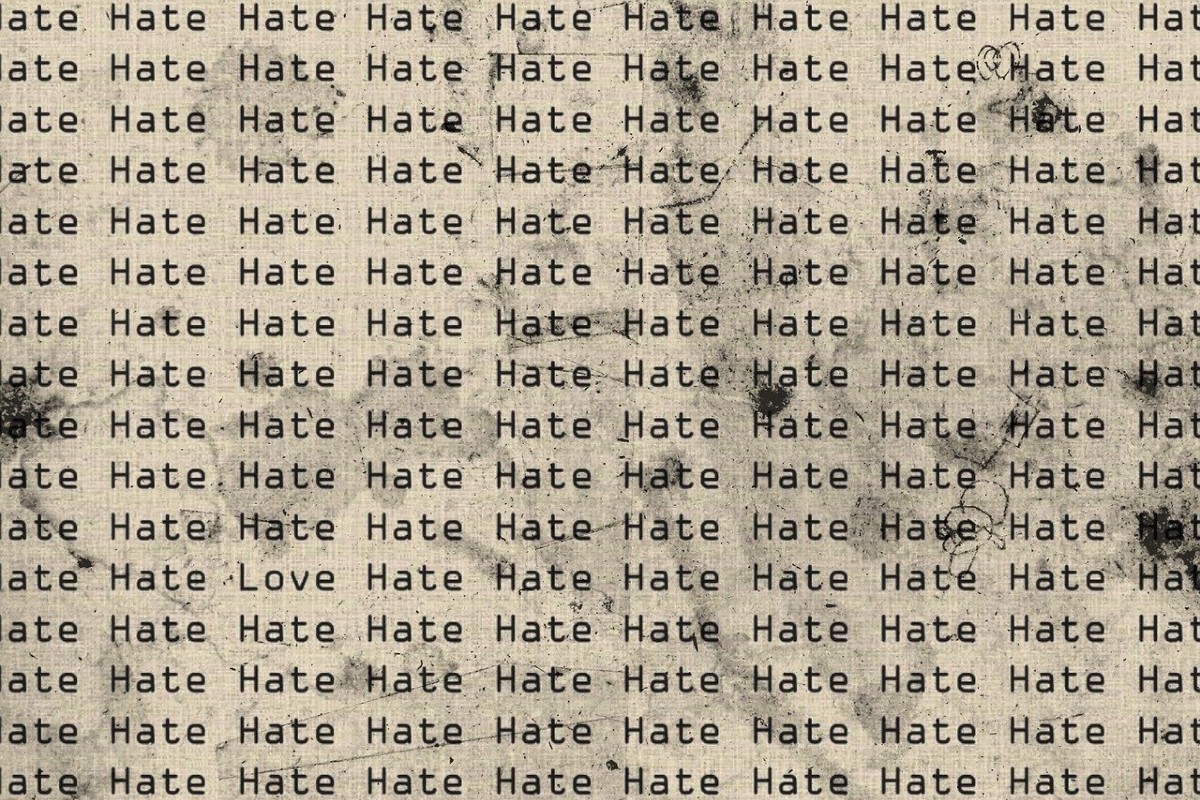
By Lindsay Street, Statehouse correspondent | A startup coalition is rallying ahead of the 2021-2022 session to urge lawmakers to finally pass a hate crimes law in South Carolina, an effort that has failed for years.
“South Carolina is ready for this law, this year especially. It’s unfortunate this didn’t happen after Mother Emanuel (deaths in 2015), but this year we’ve seen a shift in awareness in systemic racism and I think there is incentive for lawmakers and business leaders that our state sends a message,” said Brandon Fish, director of the Jewish Community Relations Council of Greater Charleston, one of several groups pushing for hate crimes legislation.
South Carolina is one of three states in the nation with no law that criminalizes crimes committed with hate for a person’s race, religion, sexuality or gender. But the no-law club is dwindling. At the start of 2020, South Carolina was grouped with four other states without a hate crimes law. In June, Georgia Republican Gov. Brian Kemp signed into law hate crimes legislation in the aftermath of an alleged vigilante killing of an unarmed Black man.
That left South Carolina aligned only with Wyoming and Arkansas. With a recent push from Arkansas Republican Gov. Asa Hutchinson and lawmakers on the passage of a hate crimes bill, South Carolina could soon be one of two states without such protections.
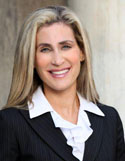
“It’d be pretty tragic to be the last state standing,” Columbia Democratic Rep. Beth Bernstein said. As a member of the Jewish community, Bernstein said it is “disappointing” the state does not have such protections. “I love our state and that’s why I’m fighting really hard to pass this type of legislation.”
Her efforts — and those of Charleston Democratic Rep. Wendell Gilliard and others — have remained fruitless, despite support from Republicans such as former House Judiciary Chair Peter McCoy, a Charleston Republican who resigned his seat this year to become the state’s U.S. attorney.
But the coalition of businesses, nonprofits and individuals are banding together now to make sure 2021 is different.
A statewide coalition in the works
The Jewish Community Relations Council of Greater Charleston, Alliance for Full Acceptance, Mother Emanuel AME Church, Charleston Hispanic Association, Lowcountry Coalition Against Hate, the Anti-Defamation League, Jewish Council for Public Affairs, Columbia Jewish Federation, Charleston Jewish Federation and others formed an official campaign earlier this year called Stamp Out Hate South Carolina.
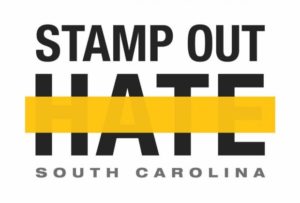 The campaign has coalesced around the 2015 Emanuel AME Church massacre, recent antisemetic attacks around the nation and murders of two transgender women of color in the state in 2019.
The campaign has coalesced around the 2015 Emanuel AME Church massacre, recent antisemetic attacks around the nation and murders of two transgender women of color in the state in 2019.
“Given the number of high profile hate crimes that have happened around the country in the past year, I think there is renewed energy to see South Carolina get a hate crimes law on the books,” said Chase Glenn, executive director of Alliance For Full Acceptance (AFFA) in North Charleston. “I believe this time will be different. We’ll get the law passed.”
Fish said the groups began talking and realized they were all working separately on the similar cause.
“Instead of working on this in all different parts of the state with all different groups, we really needed to coordinate, we can be most effective if we band together,” he said. “We all have the ear of different groups of people and bringing that all together into one effort I think will make the difference.”
Initially, the coalition wanted to pass hate crimes legislation before the end of the 2020 session, but then the coronavirus pandemic interrupted its work. The coalition shifted its focus to next year.
Glenn said the groups are still building support. In recent weeks, the group has swelled to 150 members, he said. Now, they are asking current members to begin reaching out to others.
“We are actively reaching out to leaders of all different faith communities, grassroots organizations, and municipalities across the state and we expect to grow this coalition to include hundreds of organizational supporters in the coming weeks and months,” he said.
Glenn said the hope is to have a “nice, clean bill” that “ticks all the boxes” on protected groups for pr- filing legislation in December.
Waiting for 2021
Meanwhile, the House Equitable Justice System and Law Enforcement Reform Committee had a subcommittee hear testimony in late August on why the state needs hate crimes legislation.
Charleston businesswoman Anita Zucker told the panel that, as the child of Holocaust survivors, she supports such a bill.
“The Holocaust is a strong example of what can happen when hate goes unchecked. Never again means acting now to make sure hate does not go unchecked in our state,” she said. She added that it would also be a boon to the economy. “Businesses deciding where to locate care a great deal about protecting their employees from a hate crime.”
Bernstein, who serves on the subcommittee, said there is wide agreement the legislation is needed but now it is a matter of how to apply sentencing.
“I’m highly optimistic we will be able to get this done in the upcoming session,” she said.
Republicans in the House who have signed onto the 2019-2020 bills introduced by Bernstein and Gilliard include: Bill Herbkersman of Bluffton, Gary Clary of Clemson, Weston Newton of Bluffton and Nathan Ballentine of Chapin.
In 2018, Republican Gov. Henry McMaster said he didn’t see a need for hate crimes legislation. His statement was reaffirmed in 2019 ahead of the 2020 legislative session.
House Speaker Jay Lucas, a Republican from Darlington who formed the special equitable committee in June, has not specifically called for hate crimes legislation. Senate President Harvey Peeler, R-Gaffney, did not respond to a phone message with his office seeking comment.
- Have a comment? Send to: feedback@statehousereport.com
What to expect in next week’s session
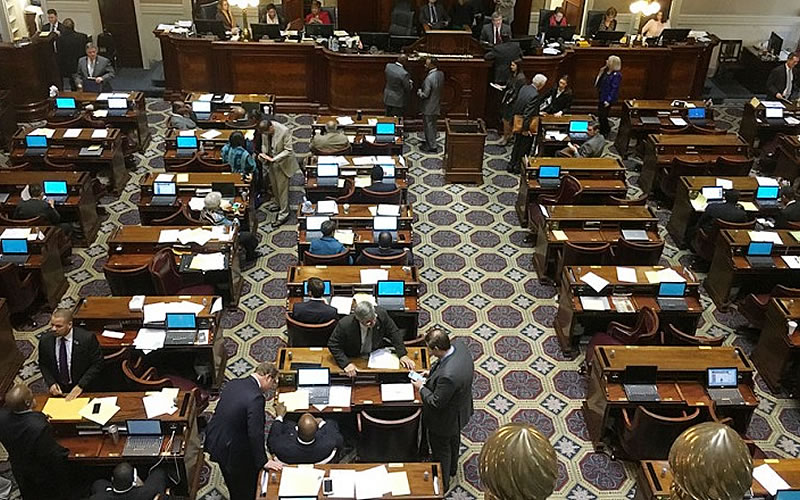
By Lindsay Street, Statehouse correspondent | The state’s 2020-21 budget and allocation of federal pandemic aid money will loom large over the special session called for the House and Senate next week, which is slated to begin Tuesday for both chambers.
The September session, which will end Sept. 24, was called so lawmakers could finish drafting a state spending plan for the 2020-2021 fiscal year already underway. The 2020 session was disrupted by the coronavirus pandemic that pummeled revenues and halted large gatherings. This mini-session joins others called since April to address the pandemic, including a recent one-day Senate session to expand absentee voting.
In a statement to Statehouse Report, House Speaker Jay Lucas, R-Darlington, said the House will “certainly ensure that the important work of the people of this state will be done” despite the limited time. Senate President Harvey Peeler, R-Gaffney, did not respond to a request to comment.

Senate Majority Leader Shane Massey of Edgefield said the two-week session will highlight what each senator thinks is important.
“There are a number of things people would like to do … but it’s kind of hard to come up with things that are going to get a consensus to move. We are still working on that,” he told Statehouse Report this week.
Beyond the second allocation of federal aid money for the pandemic, state budget and expanding absentee voting, legislators are also expected to have a joint assembly for elections to the S.C. Public Service Commission and colleges’ board of trustees, Massey said.
House Minority Leader Todd Rutherford of Columbia said the state needs to grapple with rural broadband and rural healthcare, “the two things that Democrats have been banging the table for for years” and exacerbated in the pandemic. But, he said, he hasn’t heard of any other items on the House agenda beyond the budget, federal aid and absentee voting.
On Thursday, Gov. Henry McMaster announced his proposal for spending the second phase of CARES Act money. The governor’s recommendations include $450 million to replenish the Unemployment Trust Fund, $45 million in grants for small businesses and nonprofit organizations that did not receive federal Paycheck Protection Program loans, and $93 million to reimburse the S.C. Department of Health and Environmental Control and the Medical University of South Carolina in Charleston. The House Ways and Means Committee has been meeting on the second phase of spending in recent weeks.
In other news:
![]() Senate committee looks at pharmacists, prescriptions. The Senate Medical Affairs Committee will convene 10 a.m. Tuesday in room 308 of the Gressette building on Statehouse grounds to discuss two bills that would impact pharmacists. House Bill 4663 would amend existing law that allows pharmacists to administer seasonal flu vaccines to allow the group to give vaccines regardless of a patient’s age. House Bill 4938 would allow practitioners to write prescriptions electronically. Both bills were filed prior to the pandemic.
Senate committee looks at pharmacists, prescriptions. The Senate Medical Affairs Committee will convene 10 a.m. Tuesday in room 308 of the Gressette building on Statehouse grounds to discuss two bills that would impact pharmacists. House Bill 4663 would amend existing law that allows pharmacists to administer seasonal flu vaccines to allow the group to give vaccines regardless of a patient’s age. House Bill 4938 would allow practitioners to write prescriptions electronically. Both bills were filed prior to the pandemic.
State vaccine plan announced. State leaders announced Thursday that a plan is in the works for distributing a COVID-19 vaccine when it becomes available. They said that while there is no confirmed date as to when a vaccine could become available, the plan will prioritize high-risk individuals, frontline health care workers and critical infrastructure employees when limited doses of the vaccine first arrive, said Stephen White, the state’s immunization director. Read more.
- Previous coverage: Policy questions loom large in future of vaccine plan.
Census count still low in S.C. U.S. Census Bureau Director Steven Dillingham said this week just 78 percent of South Carolina’s known addresses have been counted in the 10-year census that helps allocate federal representation and money. The count will end Sept. 30. Read more.
Economic outlook to be explored virtually. The 40th annual Economic Outlook Conference, presented by the Darla Moore School of Business at the University of South Carolina, has become the Economic Outlook Series as it will be held over two interactive, virtual events Sept. 29 and Nov. 3. The cost is $30 to attend both events or $20 to attend one event. Learn more about the series.
- Have a comment? Send to: feedback@statehousereport.com
Riley Institute at Furman University
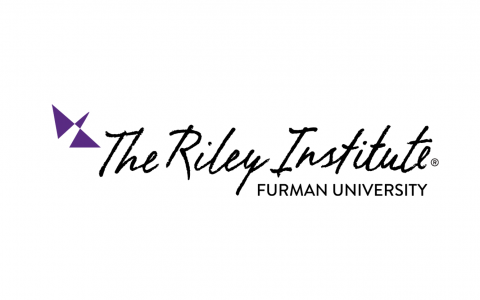 The public spiritedness of our underwriters allows us to bring Statehouse Report to you at no cost. This week’s spotlighted underwriter is Furman University’s Riley Institute, which broadens student and community perspectives about issues critical to South Carolina’s progress. It builds and engages present and future leaders, creates and shares data- supported information about the state’s core challenges, and links the leadership body to sustainable solutions.
The public spiritedness of our underwriters allows us to bring Statehouse Report to you at no cost. This week’s spotlighted underwriter is Furman University’s Riley Institute, which broadens student and community perspectives about issues critical to South Carolina’s progress. It builds and engages present and future leaders, creates and shares data- supported information about the state’s core challenges, and links the leadership body to sustainable solutions.
Launched in 1999, the Institute is named for former South Carolina Governor and former United States Secretary of Education Richard W. (Dick) Riley. It is committed to nonpartisanship in all it does and to a rhetoric-free, facts-based approach to change.
- Learn more about the Riley Institute.
- Also learn more about the Riley Institute’s Center for Education Policy and Leadership.
Fall for kindness, not coarseness, in days ahead

By Andy Brack, editor and publisher | America is coarser these days thanks, in part, to the politics of vitriol, greed to make a fast buck and the often self-absorbed bubble of the internet.
But have you noticed an increase in kindness, too? Especially since the coronavirus pandemic upended lives across the world?
“My religion is very simple. My religion is kindness.” –– Dalai Lama
 A few days ago, a longtime friend in Florida with a growing lump on his neck from throat cancer put out a plea for help. No job. No health care. In desperate need of radiation, chemotherapy and an expensive test. It’s been, as he wrote on GoFundMe.com, a dumpster fire of a year.
A few days ago, a longtime friend in Florida with a growing lump on his neck from throat cancer put out a plea for help. No job. No health care. In desperate need of radiation, chemotherapy and an expensive test. It’s been, as he wrote on GoFundMe.com, a dumpster fire of a year.
“Without a job and without health insurance, I’ve found that it’s more than a bit difficult to get treated for cancer. The local hospital has a ‘charitable’ arm — which I pursued to exhaustion — but being male, breathing and still young enough to be productive, there was no charity available for me to get treatment.”
At first, he set a goal of $5,000 to pull together enough money for the test. Friends posted it on their social media outlets. Money started flowing. A Charleston man read a post, contacted me, asked a couple of questions and said he was going to donate $3,000, which would put my friend well over his goal. Why contribute to someone he didn’t even know? “God’s been too generous with us and (we’re) happy to share.”
So far, my friend’s campaign has raised more than $7,600, which has lifted a huge burden he’s been carrying. He’s energized and more positive than in awhile. Because of a huge act of kindness from a man he doesn’t even know.
“I can’t begin to tell you what a blessing this has been and how much it will help me get started on treatment,” my friend said.
“The best portion of a good man’s life is his little, nameless, unremembered acts of kindness and of love.” — William Wordsworth
Founded in 2010, GoFundMe has helped more than 70 million donors distribute $5 billion to projects around the world. In recent days, donors have contributed more than $12,000 to an aid campaign for the family of an upstate New York man killed Aug. 31 when a car struck his bike on U.S. Highway 17 south of Charleston. His dog, Ava, was in a trailer being pulled by the bike. She almost died, but got emergency care through the Charleston Animal Society.
“Her jaw is broken in two places,” said the organization’s Kay Hyman. “She has lacerations, wounds that are stapled to help them heal. Her brain was swelling from trauma, but she is alive. Ava is one resilient dog and should make a full recovery, with intensive care and time, from her horrific accident. Emotionally, she obviously misses her dad and watches intently when a bicycle crosses her path.”
Again, help poured in. On Sept. 12, the man’s ashes and Ava are expected to be returned to upstate New York in a private jet offered by a venture capitalist. More kindness.
“One who knows how to show and to accept kindness will be a friend better than any possession.” — Sophocles
Since the pandemic, lawyers and law students have been giving back across the Lowcountry as people struggle to cope with everything from health care to the possibility of being evicted.
One example: A landlord quietly worked with a tenant to make sure a single mother with twins could stay in her home, said Alissa Lietzow, executive director of Charleston Pro Bono Legal Services. Another:
“One attorney, a private practice civil attorney for over 25 years, has been dedicating his efforts for the housing court program on a monthly basis during the pandemic,” she said. “He has helped multiple tenants prevent evictions, secure agreed-upon move-out dates and avoid evictions on their records, which can hurt their prospects of finding new housing.
“The work of pro bono housing attorneys is paramount to avert a homelessness crisis in our community that could escalate COVID cases.”
More kindness. As politics ratchets up in nastiness in the weeks ahead, let’s remember we’re all in this together. Practice random acts of kindness. Pay it forward.
- Andy Brack is editor and publisher of Statehouse Report. His column also is published in the Charleston City Paper, Florence Morning News, Greenwood Index Journal, The (Seneca) Journal, Camden Chronicle Independent and Hartsville Messenger. Have a comment? Send to: feedback@statehousereport.com.
Nullification
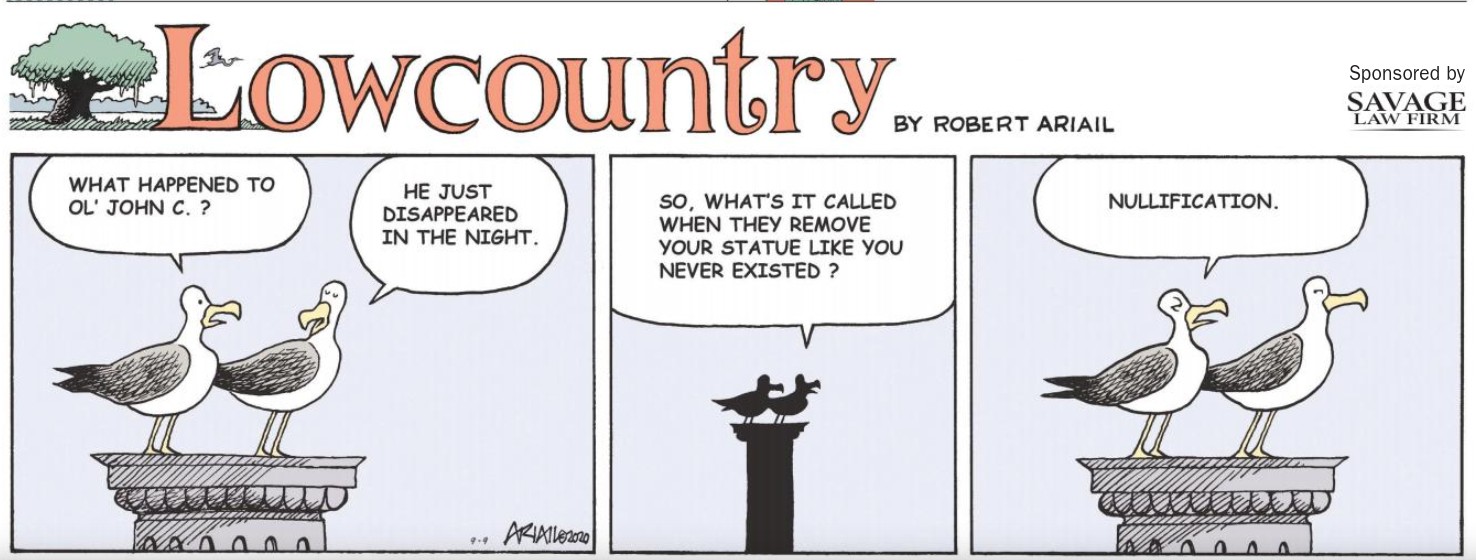
The above cartoon by Camden resident and Statehouse Report afficianado Robert Ariail debuted Wednesday as a weekly feature of the Charleston City Paper. It will be in this space every Friday.
- Love it? Hate it? What do you think: feedback@statehousereport.com.
Send us your thoughts
We love hearing from our readers and encourage you to share your opinions. But to be published, you’ve got to provide us with contact information so we can verify your letters. Letters to the editor are published weekly. We reserve the right to edit for length and clarity. Comments are limited to 250 words or less. Please include your name and contact information.
- Send your letters or comments to: feedback@statehousereport.com
Lonely building?
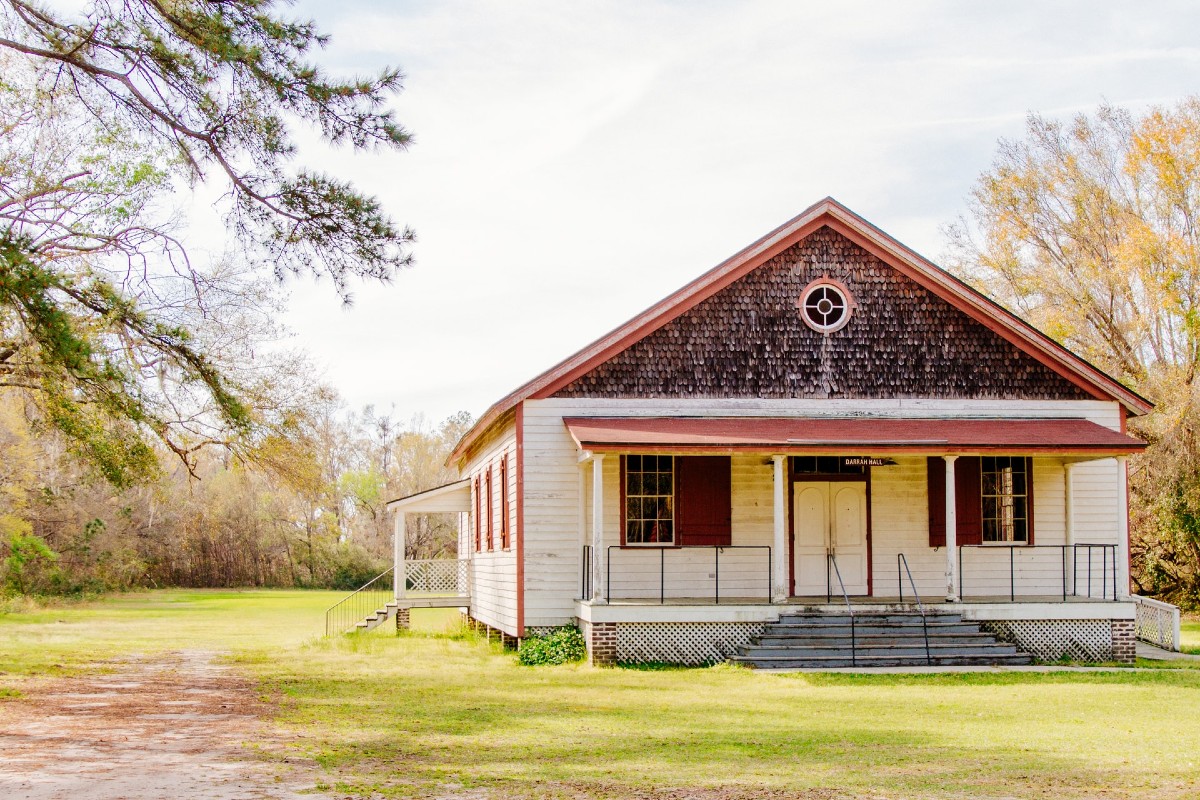
While this building might look lonely, it’s in a location where it is far from being alone. Where is it? Send to feedback@statehousereport.com. And don’t forget to include your name and the town in which you live.
Our previous Mystery Photo
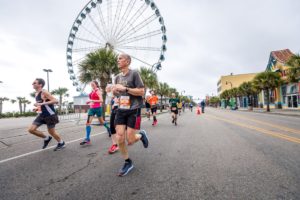 Our Sept. 4 photo, “Breaking a sweat,” is the Skywheel in Myrtle Beach in an Unsplash photo taken during one of the community’s marathons.
Our Sept. 4 photo, “Breaking a sweat,” is the Skywheel in Myrtle Beach in an Unsplash photo taken during one of the community’s marathons.
Congratulations to the many folks who correctly identified it: Dale Rhodes of Richmond, Va.; Jay Altman, Daniel Brennan and John Hart, all of Columbia; Wayne Beam and Debbie Causey, both of North Myrtle Beach; Will Bradley of Las Vegas, Nevada; Kevin Mertens of Greenville; Barry Wingard and Jacie Godfrey, both of Florence; Steve Willis of Lancaster; Mary Louise Resch of West Columbia; David Lupo of Mount Pleasant; Gwen Strickland of Marion; George Graf of Palmyra, Va.; Frank Bouknight of Summerville; Philip Cromer of Beaufort; Allan Peel of San Antonio, Texas; Henry Eldridge of Tega Cay; and Dave Taylor.
Peel added, “The joggers in the photo are taking part in the annual Myrtle Beach Mini Marathon, a 13.1-mile run which is held each year during the third weekend in October. The Mini Marathon is just one of three marathons held in Myrtle Beach during that weekend. The two other popular runs are the 3.1-mile ‘Coastal 5K’ and the 1.5-mile ‘Doggie Dash’, where dog owners can run alongside their pet dogs. This year’s events are still scheduled for Oct 17-18, 2020. Here’s hoping they are able to continue the annual tradition, now in its 11th year, despite concerns for COVID-19.”
Graf shared this info: “The railroad terminus near the beach was nicknamed ‘New Town,’ contrasting it with the ‘Old Town,’ or Conway. Around the start of the 20th century, Franklin Burroughs envisioned turning New Town into a tourist destination rivaling the Florida and northeastern beaches. Burroughs died in 1897, but his sons completed the railroad’s expansion to the beach and opened the Seaside Inn in 1901. Around 1900, a contest was held to name the area, and Burroughs’ wife suggested honoring the locally abundant shrub, the southern wax myrtle (Myrica cerifera). The Withers post office changed its name to ‘Myrtle Beach” soon afterward. It incorporated as a town in 1938 and as a city in 1957.”
- Send us a mystery: If you have a photo that you believe will stump readers, send it along (but make sure to tell us what it is because it may stump us too!) Send to: feedback@statehousereport.com and mark it as a photo submission. Thanks.
Pre-order your copy today
 Copies of a new book of historical facts about Charleston, aptly titled 350 Facts About Charleston, will be in Lowcountry-area bookstores in the next two weeks, but you can pre-order a copy today.
Copies of a new book of historical facts about Charleston, aptly titled 350 Facts About Charleston, will be in Lowcountry-area bookstores in the next two weeks, but you can pre-order a copy today.
The staff at our sister publication, the Charleston City Paper, pulled together fun and arcane information about the Holy City to illuminate its deep, rich history from its founding in 1670 until this year. (That’s, umm, 350 years!)
Included in the 224-page book are details on early settlers, the wars (Revolutionary and Civil) and the struggle for civil rights by descendants of enslaved Africans. You’ll learn about food (Charlestonians have loved to drink wine for centuries), books, people, music, culture and much more.
Bonus: Talented South Carolina cartoonist Robert Ariail offers 12 illustrations that should make a great calendar someday.
- Preview the book by visiting CharlestonFacts.com.
ABOUT STATEHOUSE REPORT
Statehouse Report, founded in 2001 as a weekly legislative forecast that informs readers about what is going to happen in South Carolina politics and policy, is provided to you at no charge every Friday.
Meet our team
- Editor and publisher: Andy Brack, 843.670.3996
- Statehouse correspondent: Lindsay Street
Donate today
We’re proud to offer Statehouse Report for free. For more than a dozen years, we’ve been the go-to place for insightful independent policy and political news and views in the Palmetto State. And we love it as much as you do.
But now, we can use your help. If you’ve been thinking of contributing to Statehouse Report over the years, now would be a great time to contribute as we deal with the crisis. In advance, thank you.
Buy the book
Now you can get a copy of editor and publisher Andy Brack’s We Can Do Better, South Carolina! ($14.99) as a paperback or as a Kindle book ($7.99). . The book of essays offers incisive commentaries by editor and publisher Andy Brack on the American South, the common good, vexing problems for the Palmetto State and interesting South Carolina leaders.
More
Mailing address: Send inquiries by mail to: 1316 Rutledge Ave., Charleston, SC 29403
Subscriptions are free: Click to subscribe.
We hope you’ll keep receiving the great news and information from Statehouse Report, but if you need to unsubscribe, go to the bottom of the weekly email issue and follow the instructions.
Read our sister publications: Charleston City Paper (every Wednesday) | Charleston Currents (every Monday).
© 2020, Statehouse Report, a publication of City Paper Publishing, LLC. All rights reserved.















 We Can Do Better, South Carolina!
We Can Do Better, South Carolina!